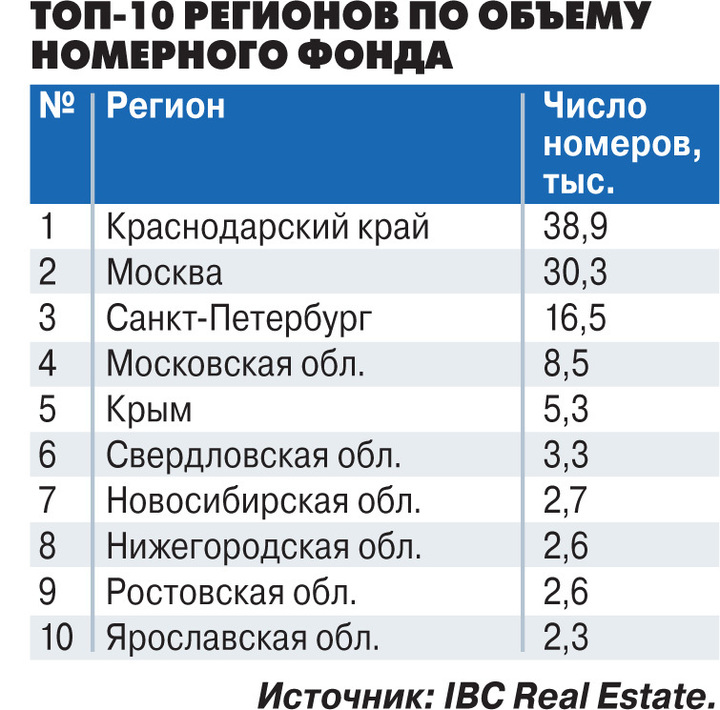Investors Stay in Hotels: Investments in Russian Hotels Increase by a Third

Analysts have recorded developer activity in the hotel sector of the national commercial real estate market. Previously, this low-margin segment with a long payback period did not particularly attract investors. But the tourism boom within the country has radically changed its potential.
According to industry analysts, in the first half of 2025, the volume of investment in hotel real estate in the Russian Federation increased by 27% year-on-year, to 15 billion rubles. “Since the beginning of the year, two hotels have opened in Moscow,” said Ksenia Alexandridi, Head of the Strategic Consulting Department at IBC Real Estate, at a press brunch. If the announced plans for commissioning hotels are implemented, the specialist noted that almost 1.2 thousand rooms will be commissioned in the capital in 2025, which will exceed the result of 2024 by 86%. This will be the highest figure since 2018. According to the expert, the occupancy rate of capital hotels in January-July was about 73%.
High investor activity has also been recorded in other tourist regions of the country. Thus, a resort hotel with 426 rooms has opened in Sochi, and a new hotel building with 400 rooms has opened in Anapa, at an all-season spa resort. Two large hotels with a total number of rooms of over 1,000 are scheduled to open in St. Petersburg this year. A city hotel complex has opened its doors in the center of Tula. New five-star hotels have opened in Perm (from scratch) and Cheboksary (after reconstruction).
Investment activity in the hotel sector of commercial real estate is explained by two factors. Firstly, state programs to support the tourism industry have gained momentum. According to the results of the fourth stage of selection of candidates for preferential lending under the program "Tourism and Hospitality" by 2030, it is planned to build 170 hotels of the three-five star category with a total of 31.6 thousand rooms. Most new tourist facilities will appear in Krasnodar Krai (19), Moscow (13) and Moscow Region (11).
"Another factor in the increase in investor activity was the growth of domestic tourism," said Irina Ushakova, head of the investment and capital markets department at the consulting company CORE.XP. According to Deputy Prime Minister Dmitry Chernyshenko, in January-June 2025, tourists made 41.4 million trips across the Russian Federation, which is 7% more than a year earlier. The leaders in the number of tourist trips were Moscow (6.0 million), Krasnodar Krai (4.4 million) and St. Petersburg (3.3 million). The top also included Moscow Region (2.7 million), Tatarstan (1.4 million), Crimea (1.1 million) and Sverdlovsk Region (1.0 million).
A solid tourist flow and a decent occupancy rate did not lead to a decrease in the cost of accommodation, since operating costs increased, and some tourists switched to more budget-friendly daily apartment rentals. As a result, in Moscow, the largest local tourism market in terms of volume, the average cost of a hotel room, according to Hotel Advisors, increased by 11% over the year, to 12 thousand rubles per day. Accommodation in luxury hotels in the capital has increased in price most noticeably - by 24% year-on-year, to 37.1 thousand rubles per day. In the economy segment, the cost of a room increased by 10%, to 4.2 thousand rubles per day.
Due to the rise in hotel rates and the growth in prices for air and rail travel, the consumer behavior of Russian tourists has changed, IBC Real Estate noted. Firstly, the average duration of a vacation has decreased (6.76 nights in 2025 versus 8 in 2020). Secondly, many began to save on food: the share of tours without meals in hotels increased to 38.5%. Thirdly, the popularity of early booking with a discount has grown: by the beginning of June 2025, tour operators sold 46% of summer tours. Fourthly, some Russians postponed their vacations until the off-season. It is no coincidence that sales of autumn tours increased by 10%. Fifthly, many changed the format of their vacation. Experts recorded a 32% increase in demand for apartments and aparthotels.
There have also been changes in the geographical preferences of Russian tourists.
As Yandex Travel analysts noted, youth tourism has shown an increased interest in small towns. At the beginning of 2025, young people booked 42.6% more hotels and apartments in small towns compared to the same period last year.
According to Olga Shirokova, partner of NF Group, the volume of investments in hotel real estate will grow due to the increase in incoming tourist flow. By 2030, the number of rooms in hotels and apart-hotels of 3-5 star categories in Russia, according to her forecast, will increase from the current 156 thousand to 230 thousand.

SINCE SEPTEMBER 1, SERVICES HAVE STOPPED OFFERING HOTELS WITHOUT CLASSIFICATION
The overwhelming majority of Russian hotels have passed self-assessment in the new classification system, said Dmitry Volvach, head of Rosaccreditation. Currently, the agency's register contains almost 18.2 thousand hotels, almost 4 thousand recreation centers, 468 campsites and more than 1.1 thousand sanatoriums with the status "active".
Let us recall that from September 1, Russian online booking services will not be able to post offers from hotels, recreation centers, campsites and sanatoriums that have not passed the classification procedure according to the new rules. According to experts, most hotels receive up to 50% of all orders through online booking services. Therefore, those who do not pass the self-assessment procedure may lose a significant part of the sales market.
Slow participants in the Russian hospitality market will also be punished with the ruble. Since September 6, regulatory authorities have the right to apply administrative fines from 300 to 450 thousand rubles to violators.
Published in the newspaper "Moskovsky Komsomolets" No. 29602 of September 9, 2025
Newspaper headline: Investors linger in hotels
mk.ru




